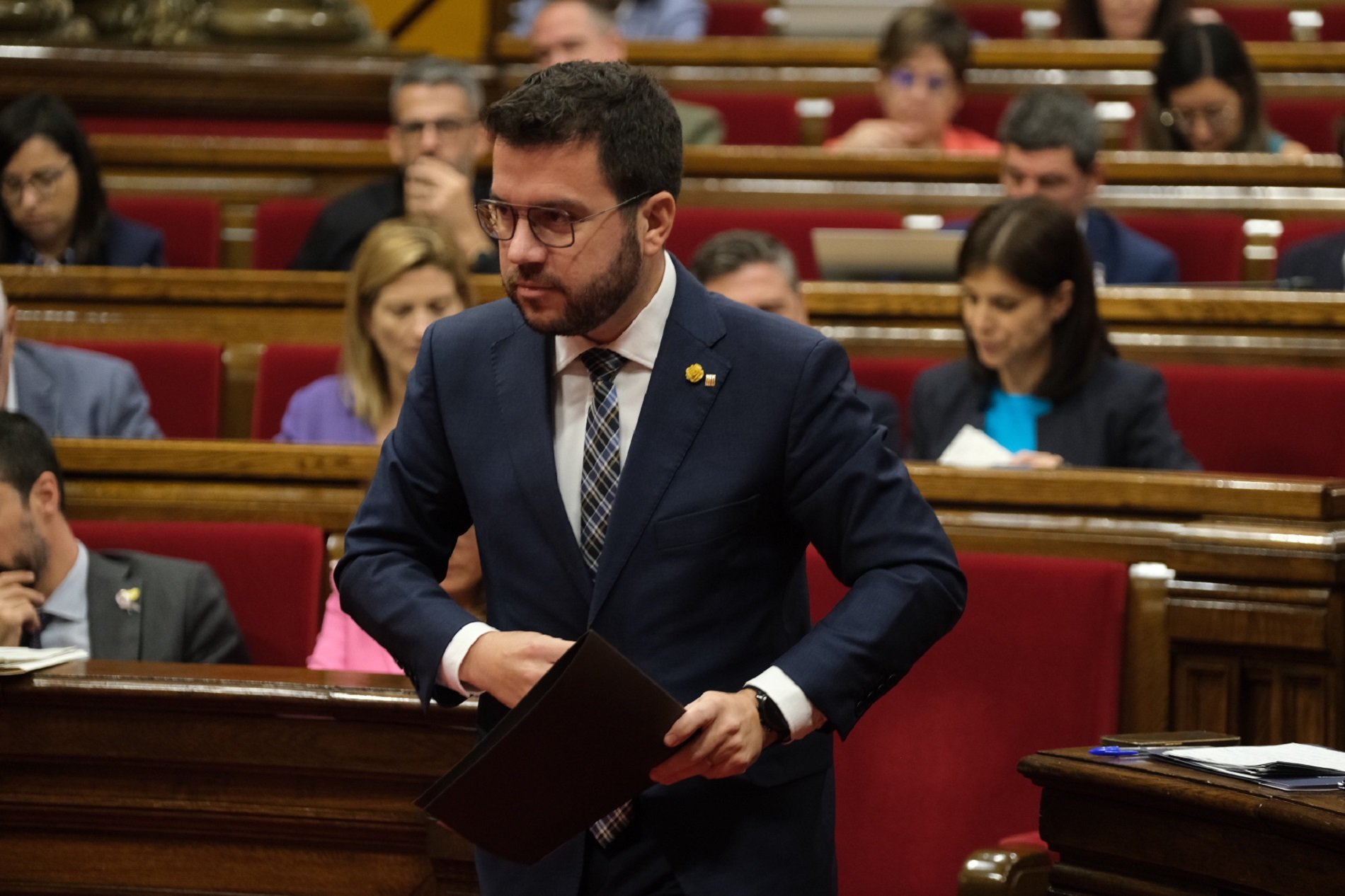A difficult day in parliament for the new government of Pere Aragonès. The Catalan president had the opportunity this Wednesday to experience what it will mean to govern with only 33 of the 135 members of the chamber. It was no surprise, but it was a cold bath of reality. All the parliamentary parties, one after the other, and with the sole exception of his own deputies in the Catalan Republican Left (ERC), rebuked Aragonès for his group's solitary position in the chamber, while the demands to call elections or submit to a confidence motion were repeated, as well as the constant question about who he plans to govern with from now on. "The weakest government in the history of Catalonia's self-government", declared the leader of the opposition, Salvador Illa, of the Catalan Socialists (PSC), while the spokesperson for his hitherto partners in Together for Catalonia (Junts) members, Albert Batet, warned him: "The reality is that you are alone. You have chosen to be alone."
Aragonès appeared first thing in this morning's session to explain the new structure of his executive and its new ministers, a consequence of Junts's decision to leave the pro-independence coalition formed last year. This occupied the first part of the morning, with a first shower of criticism. Then, the government question session arrived. This was a practical sample of what day-to-day life will be like for the new cabinet when it is in the chamber. Today, moreover, in the midst of controversy at the Catalan interior ministry following the dismissal of the head of the Mossos d'Esquadra police.
"I will not call elections"
The president's answer was direct: "I will not call elections." He made this clear as soon as he took the floor for his right of reply and after listening to the rain of reproaches from the other seven parties. Aragonès pointed to the high inflation rate and energy prices that are now assaulting families and firms as reasons why the Catalan public does not deserve an election campaign at the moment, "to see if by rolling the dice the result is a little different, not much, and someone could have another chance." The president explained that from now on ERC's strategy will consist of moving the legislature forward by looking for ad hoc majorities: "Measure by measure and project by project", "negotiating and reaching agreements. And not calling an election".
But the answer did not satisfy the opposition, who made it clear that they have no intention of making his job easier. "Don't expect my group to rescue your government," warned Salvador Illa, despite guaranteeing that his party will be a responsible opposition. In fact, aware that the ERC party president, Oriol Junqueras, has vetoed an agreement with the PSC for the budget, Illa challenged Aragonès to make a deal on the new government accounts in order to have them passed by January 1st. Outside the chamber, the Socialist spokesperson, Alicia Romero, upped the ante and refused to rule out a no-confidence motion - which could change the government without an election - if the government extends last year's budget. The alternative left En Comú Podem also made it clear that their support will not be given for free: leader Jéssica Albiach prescribed "more humility and less paternalism" to Aragonès, and reproached him for his failures to keep promises. "I would be concerned when all the parties groups tell you that you do not comply with agreements", replied Albiach, who made it clear that ERC's weakness will make budget support from the Comuns more expensive.
Junts: opposition pure and simple
Criticism came both from the left and the former partners. Junts warned that this government does not have the confidence of the chamber and has the "most insignificant support in the history of this Parliament". "He has saved himself from a confidence question because he has no intention of putting it on the table", warned Xavier Pellicer, of the radical left pro-independence CUP, who told Aragonès that the government presented today "is the same as ever, a government of the 'ex', that is to say, ex-members of Convergència, ex-Comuns and ex-Socialists." He characterised the new government by its return to old pacts: that of the sociovergència - between Socialists and centre-right Catalan nationalists - as well as "the pact with [employers group] Foment del Treball and the false normalization of relations with the Spanish state".
The new fronts that opened up in the chamber with the initial appearance of Aragonès became even more evident with the government question session. The forcefulness with which Junts deputies Mònica Sales and Ramon Tremosa questioned the enterprise minister, Roger Torrent, or MP Salvador Vergés's interrogation of climate action, food and agriculture minister Teresa Jordà, left no room for doubt about the new approach, of opposition pure and simple, which Junts is now taking in Parliament.
However, in questions with the president, Junts avoided straining the relationship. Batet criticized the low level of compliance of the Spanish state's investments, asked about ERC's support for Pedro Sánchez's budget, and called on the president to defend investments in Catalonia. In fact, Aragonès explicitly thanked him for the tone of the question.
"A new phase has begun", admitted the president of the ERC parliamentary group, Josep Maria Jové, in his speech in the question session. And it was confirmed when the vote was taken this afternoon on the bill for the Statistical Plan of Catalonia, drawn up by the economy ministry, when under the baton of Junts's Jaume Giró. It was defeated: with only 33 votes in favour (those of ERC), 59 against and 39 abstentions (Junts and the CUP). The loss of this bill does not represent a huge drama for the government, but there are many other vote to come.

